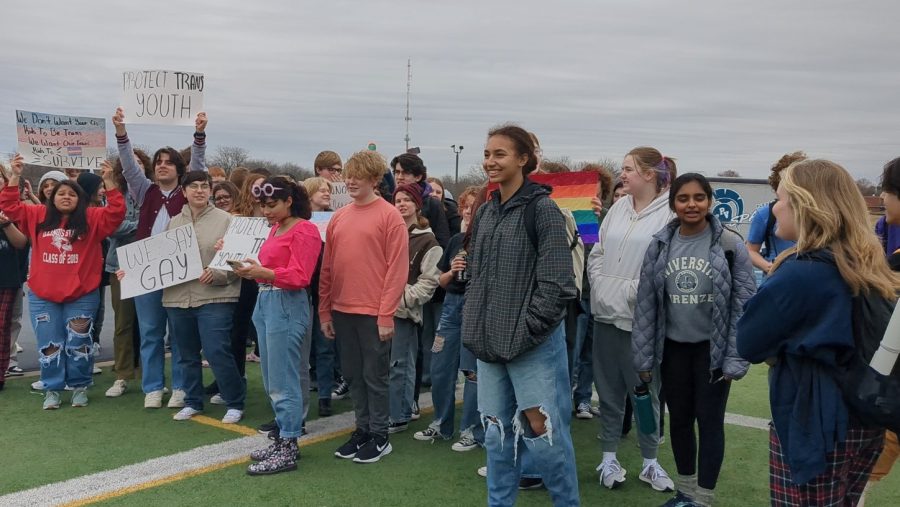Iowa bills targeting LGBTQ+ students perpetuate a community of intolerance
Numerous bills regressing the rights of the LGBTQ+ community continue to be introduced in Iowa, with many specifically targeting transgender individuals in the education system.
One proposed bill, SF 482, states that “It shall not be an unfair or discriminatory practice for a school to require a single or multiple occupancy restroom or changing area to be designated only for and used by persons of the same biological sex.” This means that legally, it is not considered discrimination if a school forces a transgender individual to use a bathroom that is inconsistent with their gender identity.
Unfortunately, this bill recently passed the Iowa Senate chamber.
If this bill passes the House, it would put transgender students in further danger of getting threatened or harassed. According to one study from Harvard University, 36% of transgender teens forced to use a bathroom differing from their gender identity reported being sexually assaulted.
In a statement to an Iowa subcommittee, Lily Bjorklund, a seven year old transgender girl from Ankeny, expressed her feelings regarding the bill. “I think you are confused about what happens in the second grade bathrooms,” said Bjorklund. “No one is hurting each other in there. I’m not hurting anyone in there. We just go to the bathroom and wash our hands. That’s how easy it is.”
This bill perpetuates the stigma that transgender or gender non-conforming people are not valid in their own gender identity because of their biological traits. It’s common knowledge that if a cisgender girl went into the boys’ bathroom, she would be in danger of being sexually assaulted or harassed. So why should there be different rules for transgender girls?
And it’s not just the bathrooms.
Iowa legislators are also coming after gender identity discussions in the classroom. Another proposed bill, SF 83, dictates that matters concerning gender identity cannot be taught in school curriculum until high school. This bill would impact thousands of students in kindergarten through eighth grade, not to mention all of the teachers who could be in danger of losing their jobs.
Parents would also have no power if this bill is passed. According to the bill, if a parent is dissatisfied with the lack of gender identity education in their child’s school, they can lodge a formal complaint with the school board. If the complaint is deemed valid, the parent can take the school to court. Even if they take these steps and win their case, the school would simply have to pay the parent a fine. Even if multiple parents complain, the school cannot change their curriculum without breaking the law.
Additionally, a similar bill recently passed the Iowa House, needing only the Senate approval to become an official law. HF 597 would prohibit any talk of sexual orientation or gender identity in Iowa classrooms from kindergarten through sixth grade. This means that these topics cannot be incorporated into classroom activities, discussions or homework in any manner.
Students could find that their own identities are not represented in any texts read in school. — Lynne Lundberg, Pleasant Valley Education Association president
PV teacher and Pleasant Valley Education Association president Lynne Lundberg believes that if such bills are implemented in the classroom, they could cause irreversible damage to the education community. “Because it’s so difficult to tell which aspects of a text would make it off-limits, many teachers will opt to avoid texts that could raise challenges,” Lundberg said. “As a result, students could find that their own identities are not represented in any texts read in school.”
Legislators have failed to realize the real world applications of these bills. If an openly transgender student joins a second grade class and is bullied because of their gender identity, the teacher cannot even mention anything about gender identity to their students, thus allowing a community of intolerance to persist within that school’s climate. Similarly, an openly transgender educator or staff member cannot talk to any children about their own gender identity, even if they are genuinely curious.
Another bill, HF 182, even proposes that the public colleges of Iowa must define several controversial terms commonly used in their college of education curricula. Then, they must report the list to the Iowa government for approval before they can teach on those topics. The list includes terms such as “Anti-racist and anti-oppressive teaching and learning” and “queer identities at all levels of kindergarten through grade twelve education.” The government will only allow these colleges to teach these concepts under the government approved definitions. This bill passed the education committee on Jan. 31 and will soon be eligible for debate on the House floor.
By forcing universities to define these terms, legislators are intending to nip this conversation in the bud. By telling future Iowa educators they cannot teach about transgender youth and sexuality without thorough regulation from the government, they are cultivating a statewide culture where educators avoid controversial topics out of fear.
All in all, there are 29 discriminatory bills targeting the LGBTQ+ community currently proposed in Iowa.
These bills ensure that LGBTQ+ youth, especially transgender students, will be put in further danger. Bills that limit discussions on gender identity and sexuality ensure that students will never have the opportunity to fully understand these concepts. When children are introduced to something they don’t understand, they can quickly turn cruel, shunning anyone different from themselves. When this fact is combined with these proposed bills and a potential lack of education at home, it’s no wonder that 49% of transgender youth have reported being bullied at school.
Bjorklund also has concerns about what these bills would mean for her physical safety. “Banning me from the bathroom I have been using for years would be so humiliating and make more bullies come after me,” she said.
Schools are meant to be a safe haven for kids of all races, religions and genders, but when bills like these continue to be proposed, it’s clear that Iowa legislators are forcing their intolerance into schools all over the state. Education cannot be effective if schools are not safe for every student, including those in marginalized communities.
PV students protest anti-gay bill
Regressive legislation has, unfortunately, become commonplace in the 21st century. With the repeal of Roe v. Wade, states have become emboldened to propose, and in some cases, pass counter-legislation relating to rights granted to American citizens in the past. This March, the GOP proposed a bill that would redefine marriage for Iowa citizens.
House file 508 introduces itself as “An act protecting religious liberty and state sovereignty relating to marriage.” The infuriating irony behind this seemingly innocent introduction is that this bill actively works to impose a heteronormative and largely Christian reality onto all Iowans. Regardless of their religious identification or personal views, this bill makes it clear where Iowa politician’s priorities lie: imposing religious doctrine over bettering the lives of all Iowans.
On March 8th, students at Pleasant Valley took matters into their own hands. Dissatisfied with her government’s work, Junior Pratima Khatri organized a walk out, providing much needed opportunity for students to showcase their anger at the discriminatory bill. “This walk-out was one of the only ways we as students could create a change, since we have very limited other options available to us. Which is why it’s so important to speak out against injustices such as these. We can’t just sit back and watch the chaos unfold. We have to take charge and make some noise in order to have any real change occur,” she states.
Khatri is no stranger to advocacy work, having been selected as this year’s Advocacy Officer on the Iowa Thespians student board. She understands the importance of speaking for change, and wants to make sure other students are able to understand the impact they can have.
As of April 6 at least 417 anti-LGBTQ laws have been introduced at the state level, higher than the previous 3 years combined. This new-found momentum is fueled by the upcoming midterm elections. Republican politicians across the country are emboldened by the recent polarization of American politics. Politicians are no longer concerned with providing better lives for citizens, instead trying to push opposing agendas on matters that shouldn’t be restricted in the first place.
In Iowa alone, nearly 30 bills have been introduced this year that would limit the rights of LGBTQ citizens. It’s clear that politicians are prioritizing religious rhetoric over rights, creating further divide in the state by failing to separate church and state. 14 of these bills would directly affect students.
Without the ability to vote against current representatives, the youth are powerless to counteract the legislation that will change their lives for the worse. Instead of focusing on academics and activities, students are fighting for the right to simply be themselves at school.
Junior Kiera Bowman feels the weight of these contractions, and empathizes with her peers who are directly affected by the legislation. “My honest reaction to this bill was honestly fear. Fear for myself and fear for those around me. School is supposed to be a safe place and it’s becoming less and less of one,” she said. Students should be focusing on their studies and finding out who they are, not fighting for basic human rights.
Regressive legislation like this harms all students, not just those who identify with the LGBTQ+ community. Ignorance is learned, and without a safe place to discuss the lives and experiences of all people, students will enter the real world unprepared and uneducated on the people around them.
Unfortunately, these bills are not unique to Iowa. As of Mar 3, 2023 close to 400 anti-LGBTQ+ bills have been proposed in a majority of states, making it a record year for anti-LGBTQ+ bills in the United States.
These bills are actively threatening the lives and livelihoods of nearly 23 million people. As of 2022, 7% of the US population identified with the LGBTQ+ community. This community is broad and very real, despite the claims of some politicians.
Both Bowman and Khatri recognize the importance of exercising their constitutional right to protest. Bowman in particular believes the right to protest is one that cannot be left unused. “Even if it may not seem like you’re doing much, every act of civil disobedience is important. If everyone had the attitude of ‘oh I can’t change this by myself so I won’t do anything at all’ then nothing would ever get done! We have to exercise our right to protest and speak our minds,” she said.
As students see their rights being taken away, a sense of powerlessness continues to spread. A majority of students are unable to vote to change legislation, making the issue of regressive legislation extremely frustrating. As our rights are being stripped, we are unable to stop power-hungry politicians from making our lives worse for their benefit.
The importance of civil disobedience presents itself in the fact that in numbers, students can make a difference and let politicians know that their changes are unwanted and unnecessary.
In a time where students should be focusing on learning how the government should be working, they are forced to take a stand against politicians who should have their best interests in mind.




















